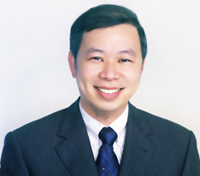| |
 |
|
|
 |
| |
 |
|
|
::: Two NTU Professors Won International Honors: Dr. Cheng Ming-syan Was Elected 2006 ACM Fellow, Dr. Cheng Kwang-cheng Elected 2007 IEEE Fellow
In November of 2006, Professor Chen Kwang-cheng of the Graduate Institute of Communication Engineering of NTU was elected fellow of IEEE (Institute of Electrical and Electronic Engineers) for his outstanding contribution in the area of wireless broadband communications and wireless local area networks. In the same month, Professor Chen Ming-syan of the same institute had the distinguished honor of being elected fellow of ACM for his excellent research "Contributions to Query Processing and Data Mining."
By virtue of his outstanding contribution to the area of wireless broadband communications and wireless local area networks, Professor Chen Kwang-cheng won the distinguished honor of being elected fellow of IEEE 2007. IEEE screens candidates for fellowship award once every year, and the number of awardees is not allowed to exceed one in every one thousand members. The screening process is considered to be very scrupulous. Yet, NTU's college of Electrical and Computer Engineering abounds with talented faculty, over the years many professors have won this coveted fellowship up to the present 18 Professors have won IEEE fellowship by doing local research.
|
In the area of wireless networks communications, Professor Chen Kwang-cheng distinguished himself by successfully combining research findings with real system design and developed a novel theoretical analysis method from the wireless access protocol of declining channels. His theoretical analysis method is an invention which solves the problem of multiple access in wireless network communication. It broke the ground for quality assurance in multiple access in wireless networks communication and can be further applied to multiple media wireless communication such as 3G CDMA.
|
NTU's Professor Chen Kwang-cheng was honorably elected Fellow of IEEE 2007.
|
|
A major challenge in practical wireless communications is to recover the carrier phase and timing of signal waveform (the synchronization problem). Professor Chen sought to achieve synchronization by advancing digital signal processing techniques, thereby realizing the dream of the much heralded software radio. Moreover, he was able to comprehensively analyze the efficacy of indoor wireless spread spectrum communications to provide criteria for many international wireless communication standard setting. His multiple-user communication theoretical structure not only solved the problem of synchronization and interference, but contributed the core technology of interface identification and adaptive frequency hopping to IEEE and Bluetooth, which was conducive to the setting of international standards.
Professor Chen Kwang-cheng successfully integrated theory and practice. His achievement fulfilled the gap among theory-design-patent-product which has been long-existing between the communication industry and the chip designing industry in Taiwan. He designed a unique communication system structure by use of communication theory, which led to the development of the lowest power consumption chip in the industry, and was able to integrate apparatus such as antenna into the SD card. This technology has since become the benchmark for technical standard in global wireless communication industry. Technologies developed by Professor Chen such as 802.11 (for indoor spread spectrum communications and infrared transmission), IEEE 802.15.2 (for co-existence at ISM band), and Bluetooth SIG (for adaptive frequency hopping) are widely adopted internationally and are considered to be forerunners in the global wireless communication technology development. Due to his pioneering effort, discovery channel interviewed him for a special episode which was broadcasted in North America
|
|
|
Copyright © 2006 National Taiwan University
No. 1, Sec. 4, Roosevelt Road, Taipei, 10617 Taiwan(R.O.C.)
Phone: +886-2-3366-3366 Fax: +886-2-2362-7651
|


